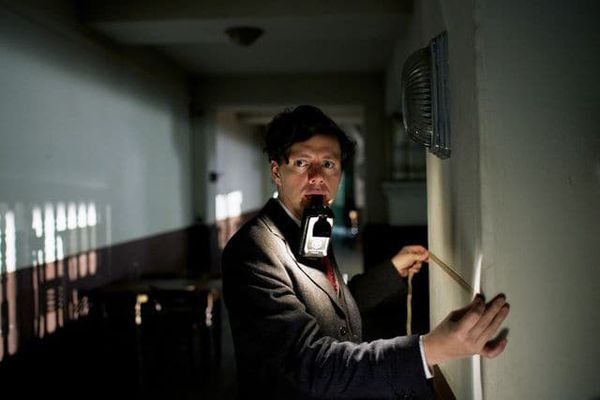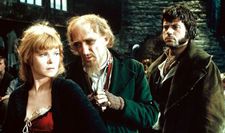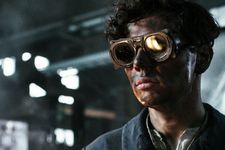 |
| Hirschbiegel on Elser: 'He's the first serious resistance fighter. He has the vision - it's almost clairvoyant really - that if Hitler is not stopped, it will lead to catastrophe' |
While German army officer and would-be Hitler assassin Claus von Stauffenberg's 1944 attempt has long been celebrated, Elser - notably, from much humbler origins - spent many years in the wilderness in terms of recognition. This lack of acknowledgement is something Hirschbiegel brands "a shameful, embarrassing black spot on our history - that's my interpretation".
 |
| Oliver Hirschbiegel: 'We are talking at least 40 million lives saved by one man. It's mindblowing' Photo: Courtesy of Berlinale |
Hirschbiegel, who spoke to us at Edinburgh Film Festival where his film received its UK premiere after its world premiere in Berlin earlier this year, is pleased the situation has changed now, not least because Elser's nephew Franz Hirth campaigned long and hard for his uncle's name to be celebrated.
"His nephew lived in Munich when he was a little boy and he saw him come there," says Hirschibiegel. "He stayed with them sometimes and had supper with them and he even had his work box in their place. He fought life-long for Elser to be recognised as a resistance fighter and he's very happy with the film, so that's good."
The film charts Elser's early years in the German countryside, celebrating the bucolic richness of the landscape in flashback while we see Elser, captured after his failed attempt to set a bomb in the Bürgerbräukeller in Munich, tortured in the present. It was the opportunity to portray an aspect of country life before Hitler that also drew Hirschbiegel to the project after he had rejected an earlier script concerning the resistance fight which though "very good" was "based on a more American kind of structure".
The Breinersdorfers (a father and daughter team) had been working on their project for around six years. "I kept telling them, 'Just come when you feel like it's ready'," says Hirschibiegel.
 |
| Hirschbiegel on Friedel: 'You're not watching them act - you're watching them 'becoming' that character' Photo: Lucky Bird Pictures |
Although it's impossible to know what would have happened if Elser had been successful, it's fair to say that the outcome for Europe would have been very different.
"There's various interpretations, but I think it's certain - and they all agree - that the Holocaust would not have happened," says Hirschbiegel. "The Second World War, as it stands, would have never happened. So, I suppose we are talking at least 40 million lives saved by one man. It's mindblowing. He wasn't aware of that, of course. But looking at that now - he would have changed history massively. Poland was already occupied, there was a strong faction within the Wehrmacht who wanted payback with the French, so they might have attacked France. But I don't think they would have taken it much further. The Nazi movement would have been destroyed because everyone was around Hitler at the time. The safest is to say is that he would have saved millions and millions and millions of lives."
After working with such well-known names as Naomi Watts on Diana and Bruno Ganz on Downfall, it seems like a bit of a gamble to have taken a chance by casting the relatively unknown Christian Friedel in the title role. But Hirschbiegel says the actor caught his eye when he played the school teacher in Michael Haneke's The White Ribbon.
"I was fascinated by his performance and I knew I needed to work with that man," he adds. "We had a couple of really good guys there and they were all good. But Christian came in and he was not just good, he was Georg Elser. Like Bruno. There's this magic that can work - sometimes that happens. You're not watching them act - you're watching them 'becoming' that character. Bruno did that with Hitler and Christian did that with Georg. It was evident and clear to all the producers and executives. He was the smallest name we had but he was the best for part."
 |
| Hirschbiegel: 'Torture means we do something horrible to one of our kind that you would never do to any animal unless you were a complete psychopath' Photo: Lucky Bird Pictures |
"We talked a lot about the interrogation and torture," says Hirschbiegel. "What do people do with they torture? What do people who are tortured do?
"For me it was important to have it in the film because I grew up in a world that has a line and beyond that line is rape, torture, child abuse, killing a human being. And recently, in the past years, I see this watered down. So we see people talk about using torture in certain circumstances - wait a minute! The same with the death penalty, it's like Whoa! Whoa! Whoa! Because nobody knows what that means. Torture means we do something horrible to one of our kind that you would never do to any animal unless you were a complete psychopath. You wouldn't take a cat or a dog and suffocate it or water board, so people don't realise what they're talking about."
One of the most interesting characters in the film is a stenographer who types up Elser's torture sessions. At one point she is sitting in a hallway and can hear him being tortured. After a moment, she moves a few seats further away from the noise, it's a chilling 'out of sight, out of mind' sort of gesture.
 |
| Hirschbiegel: 'We underestimate our instincts - we underestimate the power and the danger with them' Photo: Lucky Bird Pictures |
"We underestimate our instincts - we underestimate the power and the danger with them. It's a childish thought to think that you are in control. Because a child wants that, that there's a mother and father watching over me, that in the morning I get my breakfast and then I go to school and then I get my supper. There's good and bad and right and wrong - but it's not like that."
Next Hirschbiegel is turning his attention to television for mini-series Back To Back. "I'm going into the 70s," he says. "It's the year 1973 in East and West Berlin, it's a very well-written six-parter, written by Paula Milne. She did very good research about the German situation. She wrote it all in English but two-thirds of it is going to be shot in German and a third is in English."
13 Minutes is released by StudioCanal at cinemas across the UK on July 17. Sony Pictures Classics has the rights to the film in the US but no release date has yet been set.





















